PROMO!
First order? Get 10% OFF with this code: 1storder
PROMO!
First order? Get 10% OFF with this code: 1storder
Our Product Categories
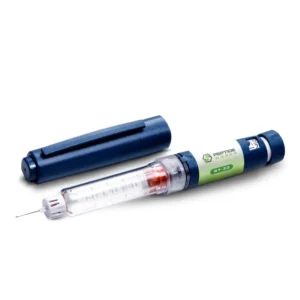
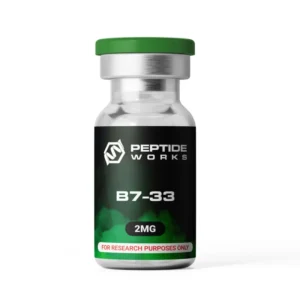
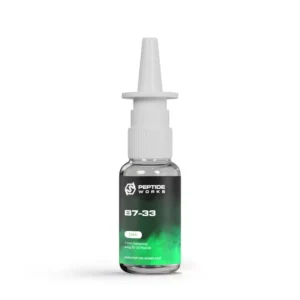
B7-33 is a synthetic peptide based on the relaxin hormone and has been gaining attention in research for its potential applications in tissue repair, reducing fibrosis, and boosting cardiovascular health. As a research compound, B7-33 provides scientists with a powerful tool to better understand how cells respond to injury and scarring in laboratory studies.
Its unique properties make it a focus of interest in preclinical studies aimed at advancing knowledge in regenerative medicine and chronic disease management. B7-33 is strictly intended for laboratory research and is not approved for human or clinical use, ensuring its role remains within scientific exploration.
Peptide Sequence (IUPAC Condensed): VIKLSGRELVRAQIAISGMSTWSKRSL
Molecular Formula: C131H228N40O37S
Molecular Weight: 2987,75 g/mol
Synonyms: relaxin peptide / relaxin analog
View the B7-33 Certificate Of Analysis (COA)
View the B7-33 High Performance Liquid Chromatography (HPLC)
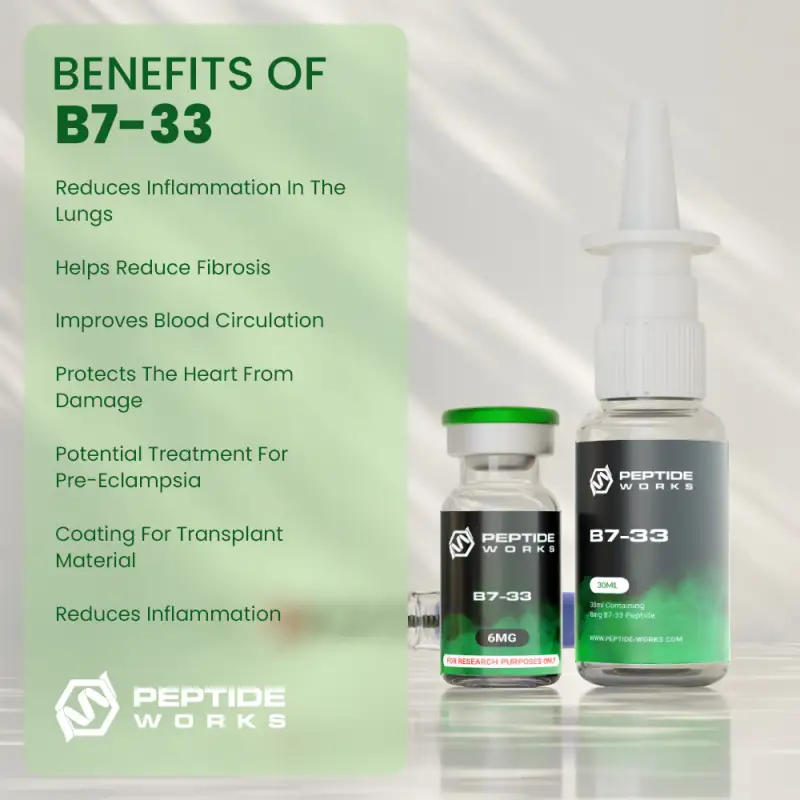
B7-33 acts similarly to the hormone relaxin by specifically targeting Relaxin Family Peptide Receptor 1 (RXFP1), a receptor located on the surface of cells. When B7-33 binds to this receptor, it triggers several signaling pathways that help the body heal in response to injury and fibrosis. These include:
One key benefit is its ability to regulate collagen production, helping to prevent the excessive buildup often linked to fibrosis development. Furthermore, it effectively controls inflammation, reducing the risk of long-term tissue damage.
B7-33 also plays a role in influencing fibroblast activity and remodeling the extracellular matrix, which are crucial for healing and reducing scars. This precise way of working makes it an important substance for researchers studying fibrosis, heart health, and tissue regeneration in early-stage models. It opens up new possibilities for developing treatment strategies in these areas.
Buy B7-33 Peptide Vial from Peptide Works, with a purity of + 99% for research purposes. Available in 2mg and 6mg vials, and also in kits, including bacteriostatic water for reconstitution, along with syringes.
Anti-Inflammatory Properties: In vitro research suggests B7-33 has anti-inflammatory effects due to its activation of the RXFP1 receptor, which is involved in immune and inflammatory signalling pathways. Studies have demonstrated that it reduces pro-inflammatory cytokines, oxidative stress, and promotes tissue repair via cAMP-PKA and PI3K-Akt pathways. This dual role enables its effectiveness in treating fibrosis, lung inflammation, and inflammation-associated cardiovascular diseases [1].
Anti-Fibrotic Effects: B7-33 is a promising research peptide for fibrosis. Fibrosis occurs when overactive wound healing leads to excessive scar tissue. B7-33 works by activating RXFP1 receptors. This action reduces collagen buildup and controls fibroblast activity, which in turn prevents tissue stiffening caused by too many extracellular matrix proteins.
Fibrosis harms organs such as the lungs, heart, liver, and kidneys, preventing them from functioning correctly. This scarring can cause severe conditions such as pulmonary fibrosis, cardiac fibrosis, cirrhosis, and chronic kidney disease. B7-33 could greatly help fibrosis research by controlling inflammation and encouraging proper tissue repair [2].
Cardioprotective Effects: B7-33 offers a simpler, cheaper way to protect the heart than the hormone relaxin (RLX). A recent animal study showed that the peptide protected the heart just as well as RLX. It cut down on heart inflammation, scarring, and enlarged cells, and made blood vessels and the aorta work better. Compared to the common drug perindopril, B7-33 showed faster anti-scarring effects, highlighting its potential as a powerful and promising treatment for heart damage and related conditions [3].
Vasoprotective Properties: A recent study showed that, like serelaxin, B7-33 enhances endothelium-dependent relaxation in rat mesenteric arteries, improving blood vessel function. Furthermore, the peptide successfully prevented endothelial dysfunction in a mouse model mimicking preeclampsia by modulating vascular endothelial growth factor activity. These findings demonstrate that equimolar doses of B7-33 replicate the beneficial vascular effects of serelaxin, positioning it as a promising and affordable therapeutic for various cardiovascular diseases, including preeclampsia [4].
Potential Treatment of Pre-eclampsia: B7-33 shows significant promise for treating pre-eclampsia, a serious hypertensive disorder in pregnancy. In recent rodent model research studies, the peptide successfully attenuated symptoms of the preeclampsia phenotype. It normalized high blood pressure, reduced proteinuria, and lowered key inflammatory markers, such as TNF-alpha and sFlt-1. Demonstrating equivalent efficacy to H2 relaxin, B7-33 has emerged as an ideal candidate for development into a novel therapeutic for pre-eclampsia, offering hope for a much-needed treatment [5].
[1] M A Hossain, M Kocan, S T Yao, S G Royce, et al (2016). A single-chain derivative of the relaxin hormone is a functionally selective agonist of the G protein-coupled receptor, RXFP1 – Chemical Science, 2016 Jun 1, Volume 7 (Issue 6), Pages 3805-3819.
[2] M A Hossain, M Kocan, S T Yao, S G Royce, et al (2016). A single-chain derivative of the relaxin hormone is a functionally selective agonist of the G protein-coupled receptor, RXFP1† – Chemical Science, 2016 Feb 26, Volume 7 (Issue 6), Pages 3805–3819.
[3] F Alam, T A. Gaspari, B K. Kemp-Harper, E Low, et al (2023). The single-chain relaxin mimetic, B7-33, maintains the cardioprotective effects of relaxin and more rapidly reduces left ventricular fibrosis compared to perindopril in an experimental model of cardiomyopathy – Biomedicine & Pharmacotherapy, Volume 160, April 2023, Page 114370.
[4] S A Marshall, K O’Sullivan, H H Ng, R A D Bathgate, et al (2017). B7-33 replicates the vasoprotective functions of human relaxin-2 (serelaxin) – Eur J Pharmacol, 2017 Jul 15, Volume 807, Pages 190-197.
[5] M N Uddin, L Amaral, A F Pantho, S H Afroze, et al (2024). Relaxin Like Peptide B7-33 and it’s Derivatives Demonstrate Efficacy in Rodent Models of Preeclampsia – Journal of Hypertension, May 2024, Volume 42 (Supplement 1), Page e310.
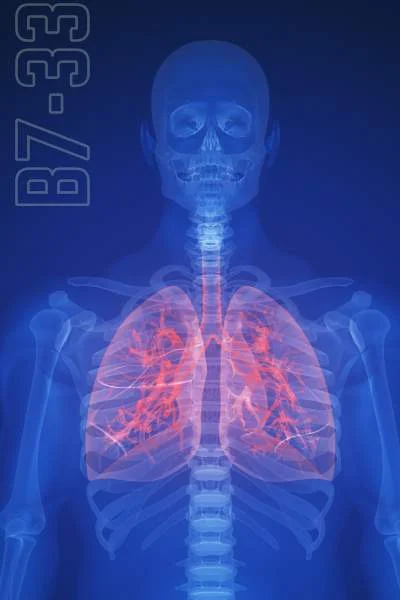
Fibrosis is an abnormal buildup of scar tissue caused by an overactive wound-healing process due to injury, chronic inflammation, or disease. It disrupts organ structure and function, commonly affecting the lungs, heart, liver, and kidneys. Linked to conditions like chronic inflammation and autoimmune diseases, fibrosis research aims to understand its mechanisms and develop treatments to prevent or reverse its damage.
B7-33 is a simplified version of the human relaxin-2 hormone, designed specifically for research. Unlike the more complex relaxin-2, B7-33 zeroes in on RXFP1 receptors to help reduce fibrosis and inflammation. It’s easier to produce, more stable, and a more affordable option for studying fibrosis and tissue repair.
It is only legal to buy B7-33 for research use. It is not FDA-approved for human use. Regulations differ by region, so buyers should confirm local laws before ordering. This product is intended strictly for laboratory research and complies with all applicable research-use standards.
The peptide may cause mild reactions in lab tests, such as changes in blood pressure or heart rate. Some studies also note slight irritation at injection sites in research models. Data on side effects is still limited, and results can vary based on test conditions. Researchers should handle B7-33 carefully and follow proper lab safety protocols.

This blog looks at the impressive heart-protective benefits of B7-33, a new breakthrough in cardiovascular research. The peptide helps reduce cardiac fibrosis, regulate collagen production, repair heart tissue, and control inflammation at the cellular level. By preventing scarring, safeguarding heart cells, and supporting the immune system, it offers significant potential for advancing heart health and recovery.
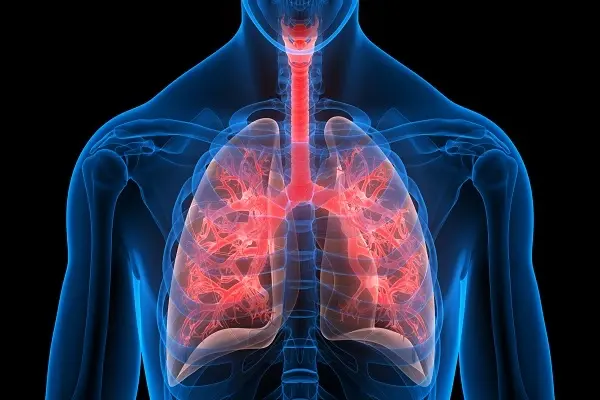
This blog explores how the B7-33 peptide could help fight fibrosis by reducing collagen production, controlling inflammation, and activating RXFP1 receptors. We’ll look at the link between senescent cells and scarring, discuss the impact of chronic inflammation, and highlight how peptides like B7-33 and FOXO4-DRI could transform fibrosis research and improve tissue repair.

This blog looks at how the peptide Hexarelin may help the heart in research. It explains how it may support heart strength, lower stress, and reduce stiff tissue. The blog also covers how changes in collagen affect heart function and why other peptides are being studied. Overall, it shows how peptide research may guide future heart studies.
Excellent Customer Support
Value For Money
99% Pure Guaranteed
World Wide Shipping
ALL CONTENT AND PRODUCT INFORMATION AVAILABLE ON THIS WEBSITE IS FOR EDUCATIONAL PURPOSES ONLY.
DISCLAIMER: These products are intended solely as a research chemical only. This classification allows for their use only for research development and laboratory studies. The information available on our Peptide Works website: https://peptide-works.com/ is provided for educational purposes only. These products are not for human or animal use or consumption in any manner. Handling of these products should be limited to suitably qualified professionals. They are not to be classified as a drug, food, cosmetic, or medicinal product and must not be mislabelled or used as such.